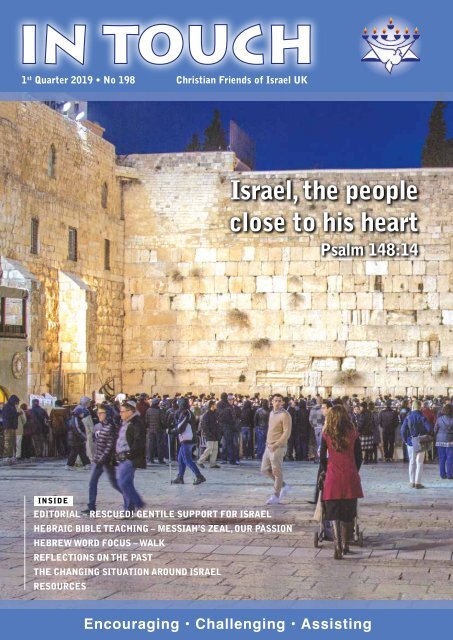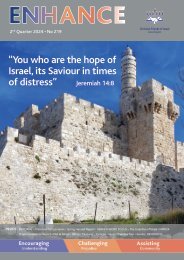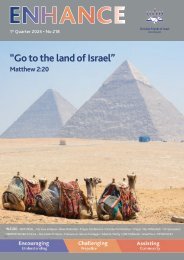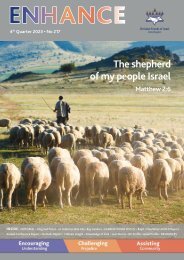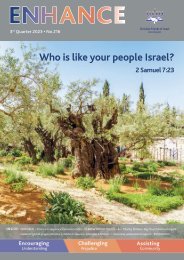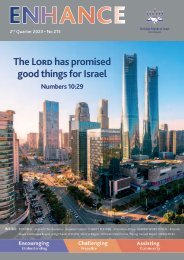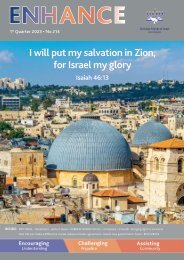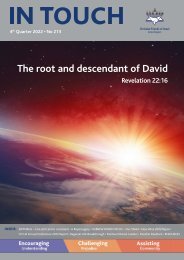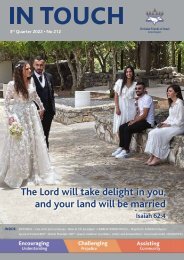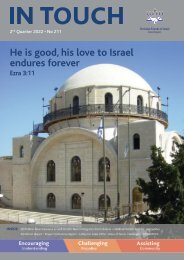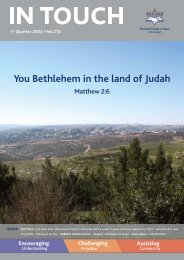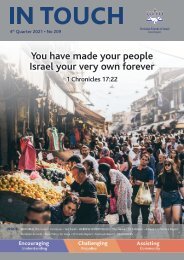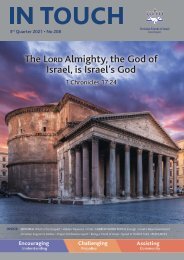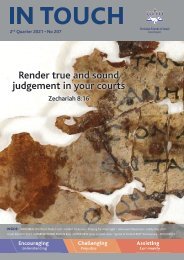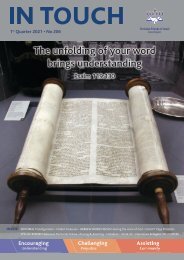Create successful ePaper yourself
Turn your PDF publications into a flip-book with our unique Google optimized e-Paper software.
1 st <strong>Quarter</strong> <strong>2019</strong> • No 198 Christian Friends of Israel UK<br />
Israel, the people<br />
close to his heart<br />
Psalm 148:14<br />
INSIDE<br />
EDITORIAL – RESCUED! GENTILE SUPPORT FOR ISRAEL<br />
HEBRAIC BIBLE TEACHING – MESSIAH’S ZEAL, OUR PASSION<br />
HEBREW WORD FOCUS – WALK<br />
REFLECTIONS ON THE PAST<br />
THE CHANGING SITUATION AROUND ISRAEL<br />
RESOURCES<br />
Encouraging • Challenging • Assisting
Editorial<br />
Jacob Vince<br />
Rescued!<br />
Gentile support for Israel<br />
About us<br />
CFI-UK seeks to bless Israel<br />
by means of practical and<br />
moral support, and to serve the<br />
Church in teaching about God’s<br />
purposes for Israel and the<br />
Hebraic heritage of our faith.<br />
CFI-UK also produces a monthly<br />
Prayer Letter, an audio Middle<br />
East Report and distributes the<br />
Haverim Hebraic teaching CDs.<br />
Please send for full details of<br />
projects in Israel and also the<br />
teaching resources available.<br />
As an educational charity, we<br />
carry a variety of resources<br />
relevant to our purpose. We do<br />
not necessarily endorse every<br />
view expressed by our guest<br />
writers or authors.<br />
Published by:<br />
CFI Charitable Trust<br />
PO Box 2687<br />
Eastbourne<br />
BN22 7LZ<br />
Tel: 01323 410 810<br />
Email: info@cfi.org.uk<br />
www.cfi.org.uk<br />
facebook.com/cfiuk<br />
twitter.com/cfi_uk<br />
Registered Charity<br />
No. 1101899<br />
Registered Office c/o<br />
Caladine, Chantry House<br />
22 Upperton Road<br />
Eastbourne, BN21 1BF<br />
Company No: 0498515<br />
VAT Registration No: GB678780275<br />
Front Cover Image:<br />
Western Wall, Jerusalem<br />
At various times in Israel’s<br />
history, as recorded in the<br />
Hebrew Scriptures, there<br />
are Gentiles who have a significant<br />
role in expressing tangible<br />
friendship toward Israel and the<br />
Jewish people.<br />
As we know God caused the<br />
Jewish nation to bring his revelation<br />
to the world in writing, “He has<br />
revealed his word to Jacob, his laws and<br />
decrees to Israel. He has done this for no<br />
other nation” (Psalm 147:19-20). This<br />
is reinforced in the apostle Paul’s<br />
letter to the church at Rome, “What<br />
advantage, then, is there in being a Jew,<br />
or what value is there in circumcision?<br />
Much in every way! First of all, the Jews<br />
have been entrusted with the very words<br />
of God” (Romans 3:1-2). God chose<br />
law-givers, prophets, poets and<br />
witnesses to relay his composition of<br />
what we now have as the four–part<br />
canon of Scripture: Torah, Prophets,<br />
Psalms and Apostles.<br />
One of the Jews that God used,<br />
both to speak in prophecy and to<br />
write down the words, was the<br />
prophet Jeremiah along with his<br />
assistant and scribe Baruch. Toward<br />
the end of the book which takes<br />
Jeremiah’s name there is an instance<br />
where certain officials, not liking<br />
what God was saying through<br />
Jeremiah, and hence the person who<br />
God was using to say it, went to the<br />
king at the time, Zedekiah, to stop<br />
Jeremiah by putting him to death.<br />
“Then the officials said to the king,<br />
“This man should be put to death. He<br />
is discouraging the soldiers who are left<br />
in this city, as well as all the people, by<br />
the things he is saying to them. This<br />
man is not seeking the good of these<br />
people but their ruin.” “He is in your<br />
hands,” King Zedekiah answered. “The<br />
king can do nothing to oppose you.”<br />
So they took Jeremiah and put him into<br />
the cistern of Malkijah, the king’s son,<br />
which was in the courtyard of the guard.<br />
They lowered Jeremiah by ropes into the<br />
cistern; it had no water in it, only mud,<br />
and Jeremiah sank down into the mud”<br />
(Jeremiah 38:4-6).<br />
Here we see the king abdicating<br />
his authority and placing Jeremiah<br />
into the hands of officials, who then<br />
take Jeremiah and lower him into<br />
a cistern with no water but only<br />
sinking mud at the bottom. This is<br />
where Jeremiah would have been<br />
left were it not for the intervention<br />
of a Gentile, Ebed-Melek, who was<br />
a Cushite, or in today’s terms, an<br />
Ethiopian or Eritrean.<br />
“But Ebed-Melek, a Cushite, an official<br />
in the royal palace, heard that they had<br />
put Jeremiah into the cistern. While the<br />
king was sitting in the Benjamin Gate,<br />
Ebed-Melek went out of the palace and<br />
said to him, “My lord the king, these<br />
men have acted wickedly in all they<br />
have done to Jeremiah the prophet. They<br />
have thrown him into a cistern, where<br />
he will starve to death when there is<br />
no longer any bread in the city.” Then<br />
the king commanded Ebed-Melek the<br />
Cushite, “Take thirty men from here<br />
with you and lift Jeremiah the prophet<br />
out of the cistern before he dies.” So<br />
Ebed-Melek took the men with him and<br />
went to a room under the treasury in<br />
the palace. He took some old rags and<br />
worn-out clothes from there and let<br />
them down with ropes to Jeremiah in the<br />
cistern. Ebed-Melek the Cushite said to<br />
Jeremiah, “Put these old rags and wornout<br />
clothes under your arms to pad the<br />
ropes.” Jeremiah did so, and they pulled<br />
him up with the ropes and lifted him out<br />
of the cistern. And Jeremiah remained in<br />
the courtyard of the guard” (Jeremiah<br />
38:7-13).<br />
So Jeremiah was rescued and was<br />
able to continue to speak his hardto-hear<br />
prophetic words, in this<br />
instance concerning the destruction<br />
of Jerusalem and going into<br />
captivity. But he also pronounced a<br />
time limit on that captivity that the<br />
writer Daniel would later recall and<br />
pray into being, the return of the<br />
Jewish people to Israel from Babylon<br />
after seventy years.<br />
What Jeremiah conveyed as<br />
prophecy comes to pass and the<br />
tragedy of the destruction of<br />
Jerusalem and going into captivity<br />
2 IN TOUCH • 1 st <strong>Quarter</strong> <strong>2019</strong>
unfolds, including king Zedekiah<br />
having his eyes put out after seeing<br />
the slaughter of his family – the last<br />
thing he physically sees before his<br />
eyes.<br />
One of the writers of the Psalms<br />
recalls the sadness of the Israelites<br />
as they sit by the rivers of Babylon<br />
vowing never to forget Jerusalem<br />
and hang up their harps on which<br />
they would have accompanied<br />
the singing of joyful songs of Zion<br />
(Jerusalem) “May my right hand<br />
forget its skill” (Psalm 137:5) - the<br />
skill to play the instrument, and<br />
“my tongue cling to the roof of my<br />
mouth” (Psalm 137:6) without the<br />
use of the tongue they could not<br />
sing.<br />
The Gentile Ebed-Melek might<br />
easily have been forgotten in the<br />
great scheme of things, but God<br />
is no man’s debtor. Ebed-Melek<br />
had done the right thing because<br />
it was the right thing to do, not<br />
particularly seeking any reward for<br />
this. But there is a postscript to the<br />
bigger story.<br />
“While Jeremiah had been confined<br />
in the courtyard of the guard, the word<br />
of the Lord came to him: “Go and tell<br />
Ebed-Melek the Cushite, ‘This is what<br />
the Lord Almighty, the God of Israel,<br />
says: I am about to fulfil my words<br />
against this city—words concerning<br />
disaster, not prosperity. At that time<br />
they will be fulfilled before your eyes.<br />
But I will rescue you on that day,<br />
declares the Lord; you will not be given<br />
into the hands of those you fear. I will<br />
save you; you will not fall by the sword<br />
but will escape with your life, because<br />
you trust in me, declares the Lord’”<br />
(Jeremiah 39:15-18)<br />
<strong>In</strong> similar way to how Ebed-<br />
Melek was used by God to rescue<br />
Jeremiah, so we find that Ebed-<br />
Melek will in turn be rescued from<br />
He has revealed his<br />
word to Jacob, his laws<br />
and decrees to Israel<br />
the hands of those he feared. He<br />
will be saved, escaping with his life<br />
despite all around being destroyed.<br />
As Gentile Christians we should<br />
take instruction and encouragement<br />
from this story which, as the apostle<br />
Paul reminds his protégé Timothy,<br />
is part of ‘all Scripture’ that is<br />
inspired by God and profitable<br />
for teaching, reproof, correction<br />
and training in righteousness. It<br />
sets an example to us as Christian<br />
friends of Israel to do what is right<br />
in friendship toward Israel and<br />
the Jewish community here in the<br />
United Kingdom.<br />
<strong>In</strong> this connection, we have all<br />
been aware for some time of the<br />
rise in anti-Semitism, including<br />
manifestations within major<br />
political parties, illustrated by the<br />
failure to endorse the <strong>In</strong>ternational<br />
Holocaust Remembrance Alliance<br />
definition. Whilst it may be selfevident<br />
that we as Christian<br />
friends of Israel would implicitly<br />
endorse this definition, it appears<br />
timely and right to explicitly state<br />
this, hence our reproducing the<br />
definition and illustrative examples<br />
on page 9, thereby giving you the<br />
opportunity on the Response Form<br />
to add your name in agreement.<br />
Once collected, we will write to<br />
the various representative bodies<br />
of the Jewish community and their<br />
press, setting this out as Christian<br />
Friends of Israel UK on behalf of<br />
our supporters.*<br />
Thank you for giving your early<br />
attention to this important tangible<br />
expression of Christian friendship<br />
for Israel and our UK Jewish<br />
Community, in the manner of<br />
Ebed-Melek.<br />
(*Please note that we will not refer to<br />
supporters by name.)<br />
The late Dr John Gillmore<br />
It was with sadness that in the week before Christmas we heard the news that Dr John Gillmore had<br />
died suddenly. But we rejoice in the knowledge that he is gone to be with the Lord.<br />
John collapsed whilst out for a walk with his son, he was taken to hospital where he later died from<br />
a brain haemorrhage.<br />
John was a CFI UK Trustee and an area ‘Rep’ for several decades. He retired from the Board a few<br />
years ago. I had spoken to him on the telephone just a few days before his passing. He was in good<br />
humour as we spoke of many things.<br />
I have always liked and appreciated John, his humour and his laugh remain in my mind. John’s<br />
contributions on the Trustee Board were always prayerfully and wisely considered and gracefully<br />
given. He was a long-standing friend and supporter of the late Gerald Gotzen and visited Ethiopia to<br />
see the work he was doing amongst the Jewish people in Addis Ababa and around that Country.<br />
John was also the only Trustee that could operate the gas fire in the room where we held our three-day winter ‘Way Ahead’<br />
meeting!<br />
Please pray for Maureen and the family, that they may know the presence, peace and comfort of the Lord.<br />
Let us all be comforted and encouraged with these words - “Behold, I tell you a mystery: We shall not all sleep, but we shall<br />
all be changed—in a moment, in the twinkling of an eye, at the last trumpet. For the trumpet will sound, and the dead will<br />
be raised incorruptible, and we shall be changed. For this corruptible must put on incorruption, and this mortal must put on<br />
immortality. So when this corruptible has put on incorruption, and this mortal has put on immortality, then shall be brought to<br />
pass the saying that is written: “Death is swallowed up in victory” (2 Corinthians 15:52-54).<br />
David Greer<br />
Chairman Board of Trustees<br />
1 st <strong>Quarter</strong> <strong>2019</strong> • IN TOUCH 3
Hebraic Bible Teaching<br />
James Whitman<br />
serves as president<br />
of The Centre for<br />
Judaic-Christian<br />
Studies (JC Studies)<br />
Deeper insight into our<br />
Father in heaven and his<br />
actions on earth emerge<br />
when we take time to explore the<br />
Bible’s historical context.<br />
By employing the literary tools of<br />
language and culture, we can see a<br />
familiar gospel story — and hopefully<br />
ourselves — in increasingly biblical<br />
ways. Take, for instance, the cleansing<br />
of the temple.<br />
Set in first century Jerusalem, our<br />
story takes place during the season<br />
of Israel’s Passover. We find Jesus<br />
confronting merchants plying their<br />
trade in the precincts of the temple<br />
that Herod built. It is an event that<br />
will become iconic in the historical<br />
imagination of Christianity; the fiery<br />
young prophet raging against a nation<br />
of hypocrites, calling down judgment<br />
upon their place of worship.<br />
However, is that an accurate<br />
portrayal of what happened and why?<br />
To better comprehend the significance<br />
of this event we need to ask the<br />
question, how did those who left us<br />
eyewitness accounts understand these<br />
things?<br />
John not only recounts Jesus’<br />
explanatory words but gives insight<br />
into how the early church processed<br />
both his words and deeds, “To those<br />
who sold doves he said, “Get these out of<br />
here! How dare you turn my Father’s house<br />
into a market!” His disciples remembered<br />
that it is written: “Zeal for your house will<br />
consume me”” (John 2:16-17).<br />
The first important concept to grasp<br />
is the phrase “my Father’s house.” The<br />
Jewish people of the day recognised<br />
from Scripture that God is a Father to<br />
his covenant children. “Our Father<br />
and our King” is language from ancient<br />
prayer formulas still active in Jewish<br />
worship today. However to say, my<br />
Father, was unthinkable. This was a<br />
day and age when even the sacred<br />
name of God was not spoken for fear<br />
of defiling the Holy. By saying ‘my<br />
Father’, Jesus was making messianic<br />
connections.<br />
Though subtle and easy for us<br />
to miss, to those who heard him it<br />
Messiah’s zeal,<br />
Our passion<br />
James Whitman<br />
was a shocking claim of exclusive<br />
relationship evoking Psalm 2:7, Psalm<br />
89:26-29, and 2 Samuel 7:12-16. These<br />
sacred texts were front and centre in<br />
a vibrant cultural conversation about<br />
the coming Messiah’s identity. The<br />
result was polarising. Luke’s record<br />
of the event observes, “Every day he was<br />
teaching at the temple. But the chief priests,<br />
the teachers of the law and the leaders<br />
among the people were trying to kill him.<br />
Yet they could not find any way to do it,<br />
because all the people hung on his words.”<br />
(Luke 19:47-48)<br />
Further, our Lord’s description of<br />
the temple as a “house of prayer for<br />
all the nations” (Mark 11:17), gives<br />
evidence of his heart for the place and<br />
the people. We first encountered this<br />
revelation in another story that took<br />
place at Passover. At that time, the<br />
young Messiah answered his parents<br />
with a single phrase that carries the<br />
interchangeable ideas of needing to<br />
be about his Father’s house and his<br />
Father’s business (Luke 2:49).<br />
The second important concept to<br />
grasp is the meaning of zeal, the word<br />
his first followers chose to describe<br />
Jesus’ state of mind as he cleansed the<br />
temple of merchants and merchandise.<br />
Behind the English word zeal, is the<br />
Hebrew word qin’ah which means<br />
ardour or passion. We all know the<br />
experience of our blood pressure<br />
rising as we get passionate about a<br />
subject – that is qin’ah. Some scholars<br />
have linked the Hebrew word to a root<br />
related to colour that flushes our cheeks<br />
when we experience zeal. Zelos, the<br />
Greek equivalent, suggests being hot<br />
enough to boil.<br />
Biblically speaking, ardour is<br />
manifested in relationships: God<br />
towards humanity, men and women<br />
towards God, or between one another.<br />
Most importantly it can have negative<br />
connotations (often translated by the<br />
word jealousy) or positive connotations<br />
depending on the context. Out of<br />
which kind of zeal is Jesus acting in<br />
our story? Said another way, what<br />
clue does John give us regarding Jesus’<br />
motivation that sheds light on his<br />
actions?<br />
The third important concept to grasp<br />
is the early church’s use of Psalm 69 as<br />
a commentary on the temple incident.<br />
The New Testament provides evidence<br />
that Psalm 69 played an active role<br />
in first-century Judaism’s messianic<br />
expectation. Not only is it cited or<br />
alluded to at least six times, but each<br />
usage also draws on a different verse<br />
in the psalm showing its rich range of<br />
application.<br />
Patterned after the five books of<br />
Moses (Torah), the Psalter has a fivefold<br />
division. Psalm 69 is part of Book<br />
2 (Psalms 42-72), which is categorised<br />
as, “The prayers of David the son of Jesse”<br />
(Psalm 72:20). The psalm itself has a<br />
title attribution as a Psalm of David. So<br />
when “His disciples remembered that it is<br />
written, “Zeal for your house will consume<br />
me,”” (John 2:16-17), they expect us to<br />
go back to the popular but commonly<br />
misunderstood figure of King David to<br />
know what is going on with Jesus.<br />
The Heart of David<br />
Perhaps no character in the Old<br />
Testament is more familiar than<br />
King David. We have his exploits<br />
and accomplishments recorded in<br />
both narrative histories and artistic<br />
compositions. Most Christians are<br />
not aware that within Judaism, David<br />
stands as a powerful voice in the<br />
tradition of the prophets (see Acts<br />
2:30). These prophets call God’s people<br />
to return to him in such a way that<br />
provides insight into what he has done,<br />
is doing and will do on earth.<br />
David’s life consistently exhibited a<br />
zeal that had three clear components.<br />
First, it arose from a burning heart of<br />
love for the God of Abraham, Isaac<br />
and Jacob. Second, David’s inward fire<br />
longed to see God’s covenant purposes<br />
worked out through his people in<br />
his own and future generations.<br />
Third, David desired to be an active<br />
contributor to those loving ends.<br />
That is why he wanted to build<br />
the Temple; it represented the one<br />
true God dwelling in the midst of his<br />
chosen people to extend his redeeming<br />
love to the nations. That is why God<br />
chose David as king and called him a<br />
man after his own heart.<br />
4 IN TOUCH • 1 st <strong>Quarter</strong> <strong>2019</strong>
“Let heaven and earth praise him, the<br />
seas and all that move in them, for God will<br />
save Zion and rebuild the cities of Judah.<br />
Then people will settle there and possess<br />
it; the children of his servants will inherit<br />
it, and those who love his name will dwell<br />
there.” (Psalm 69:34-36)<br />
The Heart of Jesus<br />
This background provides an<br />
essential framework for going forward<br />
in our gospel story. The zeal of Jesus is<br />
not against his Father’s house, heaven<br />
forbid! His passion is for God and<br />
God’s people. His action is directed<br />
at what the temple had become in the<br />
hands of greedy and unscrupulous<br />
leaders. The divine design to reach<br />
the poor and poor in spirit was now<br />
working against God’s goals. <strong>In</strong><br />
both Mark and Luke’s account, Jesus<br />
quotes Jeremiah in his condemnation<br />
of corrupt religious leaders and those<br />
who profit by working for them, “but<br />
you have made it a den of robbers” (Mark<br />
11:17; Luke 19:46; similarly Matthew<br />
21:13).<br />
Sadly, that powerful prophetic<br />
indictment echoes through the<br />
corridors of time, ringing true of<br />
religion in our generation as well.<br />
However, we cannot see our collective<br />
selves in the mirror of Scripture if we<br />
paint all of Israel or her leaders with<br />
the same brush. The Jewish historian<br />
Josephus and others recognised the<br />
problem in their day; there were<br />
reformers and reform movements<br />
within Judaism. One prominent part<br />
of messianic expectation in the first<br />
century was that God would raise<br />
a leader like King David to get his<br />
redemptive project back on track.<br />
Jesus would do just that, renewing<br />
the covenants by making them new<br />
in his death, resurrection, and Spiritoutpouring.<br />
John makes an intriguing<br />
edit when he quotes Psalm 69:9.<br />
<strong>In</strong>stead of “zeal for your house consumes<br />
me” he modifies the text to say “zeal<br />
for your house will consume me” (John<br />
2:17). What is going on here? The text<br />
illuminates the temple event, but it<br />
seems to have more to teach us. The<br />
early church discerned that Jesus’ allconsuming<br />
passion for God and his<br />
redemptive work on earth explain both<br />
his life and his execution.<br />
Keep in mind that when a New<br />
Testament author references the Old<br />
Testament, they include the context of<br />
the text as well. When John takes us<br />
back to Psalm 69, we hear echoes of the<br />
suffering servant reminding us what<br />
kind of king we serve. Further, when<br />
we watch how the psalm is employed<br />
by an author like Paul (Romans 15:3),<br />
we see that the reproach and rejection<br />
Jesus experienced will be, at some<br />
level, our portion as we attempt to love<br />
people for whom he died.<br />
The Heart of a Disciple<br />
Passion for God, his people and his<br />
purposes fuelled the entire trajectory<br />
of Jesus’ life. He encapsulated this in<br />
his vision of the Kingdom of God and<br />
identified it as a gift of the indwelling<br />
Spirit. As a result, his life had a<br />
cruciform shape long before the cross<br />
came into view. As our Master, he<br />
longs to share his passion with us.<br />
I want you to know that even while<br />
sharing these thoughts with you I am<br />
both convicted and conflicted by the<br />
beauty of this zeal and my natural<br />
aversion to it; deep down I know<br />
the cost. I also know from personal<br />
experience the perils of a counterfeit<br />
religious zeal that leaves my temple<br />
unclean and unchanged.<br />
At the same time, we find tremendous<br />
encouragement in this story. Jesus is<br />
indeed our champion defeating Satan,<br />
sin, and death. The invitation to join his<br />
redemptive movement reminds us that<br />
though we have a place in the salvation<br />
story, it is about so much more than us.<br />
Partaking in the Messiah’s passion and<br />
contributing to his kingdom is possible<br />
— by his Spirit, who generates a dayby-day,<br />
lifelong quest to be faithful to<br />
Immanuel.<br />
On this point, David has much to<br />
teach us as well. He asked the Lord<br />
God to share his heart with him,<br />
repeatedly, over the course of his life.<br />
When the inevitable failures to live<br />
out the grace of God in a fallen world<br />
overwhelmed him, his aim remained<br />
true because his core passion continued<br />
to burn.<br />
“Show me your ways, O Lord, teach me<br />
your paths; guide me in your truth and<br />
teach me, for you are God my Saviour, and<br />
my hope is in you all day long.”<br />
(Psalm 25:4-5)<br />
David Soakell<br />
Reflections on the past<br />
to press on in the future<br />
For those who stand with Israel,<br />
the months of December and<br />
January can seem miles apart.<br />
<strong>In</strong> one we have the joy of Chanukah,<br />
Christmas and lights; then suddenly<br />
we are plunged into the dark days of<br />
winter and look towards the difficult,<br />
but much needed, remembrance of the<br />
Holocaust. Throughout January <strong>2019</strong><br />
many such remembrance events have<br />
taken place.<br />
On 29 th November 1941, Reinhard<br />
Heydrich invited 14 senior members<br />
of the Nazi party to a ‘Final Solution’<br />
conference. That conference was held<br />
on the 20 th January 1942 at a beautiful<br />
lakeside villa in the Wannsee suburb<br />
of Berlin. It was attended by Heydrich<br />
and all 14 of the other high-ranking<br />
Nazis.<br />
11 million! 11 Million! That was the<br />
number of Jews sentenced to death<br />
after what was effectively a 90-minute<br />
lunch meeting of those Nazi leaders.<br />
It has become infamous and is known<br />
as the Wannsee Conference. The<br />
outcome was that those Nazi officials<br />
decided upon the ‘Final Solution of the<br />
Jewish Question.’ It set in motion the<br />
implementation of a plan to perform<br />
the systematic, industrial-scale murder<br />
of all the Jews within Germany’s reach,<br />
both in Europe and north-west Africa.<br />
Deciding the fate of 11 million Jews<br />
was followed by a ‘celebratory’ drink<br />
of Cognac.<br />
cont.<br />
1 st <strong>Quarter</strong> <strong>2019</strong> • IN TOUCH 5
It is important that we realise that the<br />
Nazi officials who deliberated at Villa<br />
Wannsee over their ghastly plans for<br />
exterminating European Jewry were<br />
all well-educated, with at least half of<br />
them holding doctorates. Some were<br />
also the sons of Protestant ministers,<br />
yet not one of them raised any moral<br />
objections to this heinous plot. Yes,<br />
these were powerful men. But is God,<br />
the God of Israel not more powerful?<br />
Could he not have intervened?<br />
A few years ago, whilst out working<br />
in Israel on one of my many visits, I felt<br />
the heavy burden upon my shoulders<br />
of a responsibility to the people of<br />
Israel. I questioned the Lord, “Could I<br />
really bring anything worthwhile and<br />
lasting to these people who carry the<br />
burden of being ‘God’s chosen’?” But<br />
chosen for what, they may ask?<br />
For my News Reports I met and<br />
interviewed both young and old<br />
civilians – both religious and secular,<br />
as well as army commanders. Other<br />
people included victims of terrorist<br />
attacks, the many Holocaust survivors<br />
that CFI minister to… so many people<br />
6 IN TOUCH • 1 st <strong>Quarter</strong> <strong>2019</strong><br />
who have suffered so much. Many<br />
times I have heard the same response<br />
from these Holocaust survivors who<br />
left the death camps of Europe to<br />
battle for a life in Israel; who witnessed<br />
their fathers, mothers, friends, family<br />
and others of the six million Jews<br />
massacred in the Holocaust at Belsen,<br />
Auschwitz etc. What were these people<br />
chosen for? Yet at the end of the day,<br />
God reigns, and no solution to the<br />
problem of suffering that questions this<br />
will ever satisfy.<br />
During the Holocaust, Rabbi Yisroel<br />
Spira experienced great suffering as<br />
many did. He lost his wife and children<br />
to the death camps during the Shoah.<br />
Yet it was there, precisely in the valley<br />
of tears that his holy personality<br />
stood out. He displayed goodness<br />
and kindness to his Jewish brothers,<br />
encouraging each Jew to place his<br />
trust in the Lord God and to await<br />
deliverance. After being saved from<br />
the Holocaust he settled in Brooklyn,<br />
New York, and it was there that he<br />
had a great influence on the Jewish<br />
community. He used to say, “The<br />
reason I remained alive was so that I<br />
could continue recounting to future<br />
generations what happened to us<br />
during those times.” As anti-Semitism<br />
is at an all-time high now, we who<br />
stand with Israel must never forget.<br />
One story he told was during the<br />
days of Chanukah, when Rabbi Spira lit<br />
‘candles’ made from fatty food waste in<br />
the Bergen-Belsen concentration camp.<br />
The Chanukah Menorah was cut out<br />
of raw potato and a secret ceremony<br />
was arranged. But when he recited the<br />
www.cfi.org.uk<br />
blessings while lighting the ‘candles’, a<br />
Jew asked him a question: “Rabbi, even<br />
if you stubbornly lit the Chanukah<br />
candles why would you say the<br />
blessing [“Blessed are you Lord God,<br />
who has granted us life and sustained<br />
us and enabled us to reach this time”]<br />
during a time in which thousands of<br />
Jews are dying terrible deaths.” “I<br />
too asked myself this question,” the<br />
Rabbi replied. “I looked for an answer<br />
and found one: When I recited the<br />
blessing, I saw that a large crowd had<br />
gathered – risking their own lives in<br />
so doing – to watch the lighting of the<br />
candles. By the very fact that God has<br />
such loyal Jews – prepared to give their<br />
lives for the lighting of the candles – by<br />
that very fact alone we may recite the<br />
blessing.”<br />
A Holocaust survivor I ministered to<br />
for many years’ survived the Auschwitz<br />
concentration camp and Bergen-<br />
Belsen. Her story can be read in my<br />
booklet ‘Crimes Against Humanity’.<br />
Helen’s Chanukah menorah (pictured)<br />
was used during two CFI Chanukah<br />
events in the North of England during<br />
December 2018.<br />
Even in the dark days of winter, we<br />
have to believe that God is a God of<br />
miracles, and a God of the impossible.<br />
One story that really spoke to me<br />
during Chanukah 2018 was when<br />
Rabbi Teichtel gave the best German<br />
response to the hatred and evil of the<br />
Nazis 80 years ago. He desired to light<br />
the biggest Chanukah Menorah in all<br />
of Europe at the Brandenburg Gate<br />
in Berlin – the very place that Hitler<br />
called for the destruction of the Jewish<br />
people. Rabbi Teichtel had his prayers<br />
answered.<br />
We have no idea what the rest of<br />
<strong>2019</strong> will bring. But we must stand<br />
firm, and keep standing with God’s<br />
ancient covenant people – the Jews and<br />
the nation of Israel. ‘Am Yisrael chai!’<br />
(Israel lives!)
Special Report<br />
The changing situation<br />
around Israel<br />
Robin Lane<br />
After a year of significant events<br />
in the Middle East, it is worth<br />
noting the situation that is<br />
developing around Israel. So with a<br />
map of Israel and its neighbouring<br />
countries in mind, let’s consider the<br />
situation by moving anti-clockwise<br />
around the land.<br />
The Mediterranean Sea dominates<br />
Israel’s western border and presently seems<br />
to hold little threat. But the southern section<br />
contains the Gaza Strip, the source of many<br />
problems over the last 12 months. Once<br />
the USA decided to recognise Jerusalem<br />
as Israel’s capital, Hamas started a long<br />
series of border protests called ‘The Great<br />
March of Return’ which yielded a number of<br />
propaganda successes as Israelis used live<br />
fire in defence. Hamas also developed the<br />
troublesome tactic of flying fire bombs over<br />
the border attached to kites and balloons.<br />
Thus it surprised many when Benjamin<br />
Netanyahu reached a ceasefire agreement<br />
with Hamas in November – especially given<br />
the support it receives from Iran. Overall the<br />
events of 2018 seem to have strengthened<br />
Hamas, enabling it to celebrate its 31 st<br />
Anniversary on 16 th December in front of<br />
thousands of supporters and speak of moving<br />
towards national unity for Palestinians. 1<br />
Further to the south, the peace agreement<br />
with Egypt is holding and the Egyptian<br />
authorities seem to have been very active in<br />
ceasefire negotiations between Hamas and<br />
Israel throughout recent months. <strong>In</strong>deed,<br />
there has been covert co-operation between<br />
Egypt and Israel in tackling the threat posed<br />
in the Sinai Peninsula by ISIS – a common<br />
enemy that is still active.<br />
Turning our gaze round to the south east,<br />
we see an unlikely ally for Israel in Saudi<br />
Arabia, largely again because of a common<br />
enemy – in this case Iran. Sadly, the<br />
improved relationship has become politically<br />
toxic after the controversial murder of<br />
journalist Jamal Khashoggi. 2<br />
Looking across to the east we see Jordan,<br />
the second Arab country to sign a peace<br />
agreement with Israel. As with Egypt, that<br />
peace agreement seems to be holding, but<br />
the Jordanians have become slightly less<br />
co-operative recently over a land ownership<br />
issue on the border with Israel.<br />
Further east the picture is very different.<br />
Iranian leaders continue to state their<br />
intention to destroy Israel. This is not<br />
new, but Iran’s actions in supporting and<br />
equipping both Hamas and Hezbollah have<br />
become more obvious during the last twelve<br />
months. Whilst the Iranians do seem to be<br />
in significant difficulty economically, due to<br />
renewed sanctions placed upon them by the<br />
USA, this does not seem to have reduced<br />
their enthusiasm for attacking Israel. 3<br />
As we turn our attention further north to<br />
Syria, we see the most significant changes<br />
that have taken place recently. At long last<br />
the Syrian Civil War is almost over, largely<br />
due to Russian support for Bashar al-Assad’s<br />
government. Russian forces are now firmly<br />
established in the country. As a result, Syria<br />
can start to recover and turn its attention<br />
back towards its long-term enemy, Israel.<br />
There have been repeated attempts by Iran<br />
to use Syria as a route to ship improved<br />
weapons to Hezbollah, prompting Israel<br />
to mount a series of air strikes to destroy<br />
shipments en route. However, the necessary<br />
communication with the Russians has<br />
become much more difficult since a Russian<br />
plane was shot down by Syrians who were<br />
retaliating against one of those air strikes.<br />
Immediately to the north of Israel,<br />
Lebanon continues to suffer weak leadership.<br />
This leaves Hezbollah in a very powerful<br />
position in the country – thousands of its<br />
members are now free from fighting in Syria<br />
and have gained battle experience there.<br />
Hezbollah has a significant stockpile of<br />
weaponry, but it recently suffered a setback<br />
when Israel publicised its discovery of attack<br />
tunnels that have been dug in contravention<br />
of UN Resolution 1701.<br />
Further to the north Turkey features<br />
strongly in the situation, having joined the<br />
alliance between Syria, Russia and Iran<br />
fighting in the Syrian Civil War. Turkey has<br />
increased its influence through its large<br />
army – on one occasion even preventing<br />
the Syrians and Russians from attacking<br />
a rebel enclave. President Erdogan has<br />
previously stated his desire to re-establish<br />
the Ottoman Empire, and seems determined<br />
to move against the Kurdish people in North<br />
East Syria as his next step. Perhaps more<br />
surprising is his interest in Jerusalem,<br />
revealed by several sources in a warning to<br />
the Israeli Prime Minister that President<br />
Erdogan wants to ‘claim ownership over the<br />
Jerusalem issue.’ 4<br />
Finally our attention moves to the far<br />
north. Russia has become more influential in<br />
Syria, providing extensive air support in the<br />
civil war and supplying better anti-aircraft<br />
defence systems. Russia condemned the<br />
Israeli air strikes in Syria carried out on 25 th<br />
December as ‘provocative’ and seems intent<br />
on asserting more control over the region. 5<br />
This may seem surprising given the distance<br />
between Russia and Syria. But it comes<br />
within the context of Vladimir Putin wanting<br />
to re-establish Russia as a superpower,<br />
indicated by the annexation of Crimea in<br />
2014 and support for pro-Russian forces<br />
fighting for control of Eastern Ukraine.<br />
Thus the overall situation around Israel<br />
bears an uncanny resemblance to that<br />
described in Ezekiel chapter 38. It would<br />
be good to watch developments closely and<br />
continue to pray for all aspects of God’s will<br />
to be done.<br />
Footnotes<br />
1. Hamas leader Haniya says movement wants<br />
‘national unity’ (www.aljazeera.com)<br />
2. All you need to know about Saudi journalist’s<br />
death (www.bbc.co.uk/news)<br />
3. Iran pledges to destroy Israel within 25 years as<br />
tensions rise (www.telegraph.co.uk)<br />
4. ‘Jordan, Palestine and Saudi Arabia warn Israel<br />
against Turkey’ (www.aljazeera.com)<br />
5. Russia condemns ‘Israeli’ air strikes on Syria<br />
(www.bbc.co.uk/news)<br />
1 st <strong>Quarter</strong> <strong>2019</strong> • IN TOUCH 7
Hebrew Word Focus<br />
Melissa Briggs MA<br />
Hebrew University of Jerusalem<br />
Melissa is an experienced Hebrew<br />
teacher with a desire to make the<br />
rich language of the Scriptures<br />
accessible to Christians.<br />
הָלְַך Walk<br />
Halak<br />
Melissa Briggs<br />
I<br />
assumed I would have my life all sorted out by<br />
the time I reached thirty. As a child, I observed<br />
respected adults and presumed ‘they must<br />
have arrived by now.’ <strong>In</strong> my naivety I thought any<br />
insecurities or sin struggles would be resolved by this<br />
point of ‘proper adulthood.’ Relationships would<br />
be established and stabilised. All doubts and fears<br />
would be dispelled; plans settled. I would enjoy a<br />
comfortable status quo.<br />
Now, firmly in my thirties, I realise there is no cruise<br />
control in the adventure of life. Life is not just about the<br />
destination, as glorious as eternity with the Lord will be.<br />
John Bunyan so aptly described in Pilgrim’s Progress that<br />
‘life is a journey.’<br />
Truly some hurdles have been overcome along the way.<br />
Many questions have been answered. A number of victories<br />
have been won. However, new challenges and lessons are<br />
always around the corner.<br />
Sanctification is an on-going process that<br />
cannot be rushed (especially as some of the<br />
deepest spiritual growth can occur in seasons<br />
of waiting). Our relationship with God has<br />
a constant, daily, dynamic, on-going nature.<br />
God is constantly wanting to reveal himself<br />
more, to sanctify us more, and to draw us into<br />
deeper trust and intimacy.<br />
This adventure with God entails daily<br />
choices to position ourselves ‘in step’ with his<br />
Holy Spirit: “Blessed is the man whose strength<br />
is in you, whose heart is set on pilgrimage”<br />
(Psalm 84:5).<br />
The Hebrew word for walk, הָ לַ ְך ‘Halak’ is<br />
a general term for walking or going. It can<br />
have the connotation of regularly walking<br />
in companionship and relationship with another person or<br />
a way of life. Other words in this same family of Hebrew<br />
words on the topic of movement include:<br />
’Mahalak‘מַ meaning journey and הֲלְָך<br />
Law. ‘halakah,’ the term used for the Jewish Oral הֲלָכָה<br />
This offers interpretations of the Torah for the daily ‘walk’<br />
of Jewish life, encapsulated in the Jewish literature of the<br />
Mishnah.<br />
It is closely linked with another verb יָלְַך ‘Yalak’ meaning<br />
to walk or flow (together). Walking is a metaphor that relates<br />
to progress, unity and intimacy.<br />
What does God desire for us and from us? To daily<br />
walk by faith in humility and love, illuminated by his light<br />
(which is his Word that became flesh, Jesus) according to his<br />
instruction (expressed through the holy Scriptures and the<br />
Holy Spirit):<br />
“He has told you, O man, what is good; and what does the Lord<br />
require of you but to do justice, and to love kindness, and to walk<br />
humbly with your God?” (Micah 6:8).<br />
“For you have delivered my soul from death, yes, my feet<br />
from falling, that I may walk before God in the light of life”<br />
(Psalm 56:13).<br />
Any progress in our spiritual life is only by faith. There is<br />
no other way to grow and move on with God except by faith:<br />
“For in it the righteousness of God is revealed from faith for faith,<br />
as it is written, “The righteous shall live by faith” (Romans 1:17).<br />
This means we do not know all the details of our pilgrimage<br />
ahead of time. It requires trust in his wisdom and plan: “For<br />
we walk by faith, not by sight” (2 Corinthians 5:7).<br />
There is a Biblical metaphor from farming where a stronger,<br />
wiser ox is yoked together to a weaker, less experienced ox<br />
to guide and teach him:<br />
“Take my yoke upon you and learn from me, for I am gentle and<br />
humble in heart, and you will find rest for your souls. For my yoke<br />
is easy and my burden is light” (Matthew 11:29-30).<br />
A modern equivalent to the yoke imagery<br />
would be a tandem bike. The driver on the<br />
front of the tandem bike does all the steering,<br />
so the rider on the back must put their trust<br />
in the driver to direct them both. All the back<br />
rider has to do is to choose to get on and pedal<br />
in sync with the leader to enjoy the benefit of<br />
arriving where the leader planned.<br />
God has gifted us with both the map for the<br />
journey (the life giving instruction recorded<br />
in his written and living Word), as well as a<br />
perfect guide, the Holy Spirit, who can be our<br />
helper and comforter along the way:<br />
“And your ears shall hear a word behind you,<br />
saying, “This is the way, walk in it,” when you<br />
turn to the right or when you turn to the left”<br />
(Isaiah 30:21).<br />
Jesus provided us with the perfect example of a walk with<br />
God, so he is not asking us to take a journey he was not<br />
willing to take himself.<br />
“Whoever says he abides in him [Jesus] ought to walk in the same<br />
way in which he walked” (1 John 2:6).<br />
Walking according to Jesus’ example is a testimony to<br />
the world and gives us the basis for fellowship with other<br />
believers:<br />
“But if we walk in the light, as he is in the light, we have fellowship<br />
with one another, and the blood of Jesus his Son cleanses us from<br />
all sin” (1 John 1:7).<br />
God does not promise we will be exempt from hard or sad<br />
circumstances, in fact we are told followers of Messiah will<br />
share in the fellowship of his sufferings. Thankfully he does<br />
promise that he will stay near to us the whole way:<br />
“Even though I walk through the valley of the shadow of death, I<br />
will fear no evil, for you are with me; your rod and your staff, they<br />
comfort me” (Psalm 23:4).<br />
Walking with God started all the way back in Genesis<br />
8 IN TOUCH • 1 st <strong>Quarter</strong> <strong>2019</strong>
when Adam and Eve walked with God in the Garden:<br />
“And they heard the sound of the Lord God walking in the garden<br />
in the cool of the day” (Genesis 3:8).<br />
The whole redemptive narrative is about the restoration<br />
God desires - a renewal of the way God intended fellowship<br />
with him to be.<br />
“And I will walk among you and will be your God, and you shall<br />
be my people” (Leviticus 26:12, quoted by the apostle Paul in<br />
2 Corinthians 6:16).<br />
We are specifically told that certain men of faith ‘walked<br />
with God’: Abraham, Enoch, and Noah.<br />
To begin walking with God first requires a decision to<br />
meet with him: “Do two walk together, unless they have agreed to<br />
meet?” (Amos 3:3)<br />
Jesus invites us on a journey to take up our cross and<br />
follow him (see Luke 9:23). When we enter through the<br />
gates of salvation it is not the end of our walk but only the<br />
beginning of it (see Matthew 7:13).<br />
God provides the example, the light, the guidance and the<br />
companionship - everything we need for the journey.<br />
“For you have delivered my soul from death, yes, my feet<br />
from falling, that I may walk before God in the light of life”<br />
(Psalm 56:13).<br />
The other option is to walk in darkness and the Bible<br />
warns us firmly against taking this wide path that leads<br />
to destruction: “Let us walk properly as in the daytime”<br />
(Romans 13:13).<br />
Have you begun the adventure of a ‘halak’ with God? Are<br />
you daily enjoying his precious, sanctifying companionship,<br />
help and guidance as you navigate the joys and challenges of<br />
life? He delights to ‘halak’ in fellowship with his children. It<br />
is what he intended all along.<br />
“For all the peoples walk each in the name of its god, but we<br />
will walk in the name of the Lord our God forever and ever”<br />
(Micah 4:5).<br />
If you are interested in learning the Hebrew language through online tuition (or in person if you<br />
are local to Berkshire), or if you are interested in hosting a Hebrew language day for a group<br />
in your area, please contact Melissa for more details at: hebrew.explore@gmail.com<br />
or at: www.explorehebrew.co.uk<br />
The IHRA working definition<br />
of antisemitism 2016<br />
“Antisemitism is a certain perception of Jews, which may<br />
be expressed as hatred toward Jews. Rhetorical and physical<br />
manifestations of antisemitism are directed toward Jewish<br />
or non-Jewish individuals and/or their property, toward<br />
Jewish community institutions and religious facilities.”<br />
To guide IHRA in its work, the following examples may serve as<br />
illustrations:<br />
Manifestations might include the targeting of the state of<br />
Israel, conceived as a Jewish collectivity. However, criticism of<br />
Israel similar to that levelled against any other country cannot<br />
be regarded as antisemitic. Antisemitism frequently charges<br />
Jews with conspiring to harm humanity, and it is often used<br />
to blame Jews for “why things go wrong.” It is expressed in<br />
speech, writing, visual forms and action, and employs sinister<br />
stereotypes and negative character traits.<br />
Contemporary examples of antisemitism in public life, the<br />
media, schools, the workplace, and in the religious sphere could,<br />
taking into account the overall context, include, but are not<br />
limited to:<br />
• Calling for, aiding, or justifying the killing or harming of Jews<br />
in the name of a radical ideology or an extremist view of<br />
religion.<br />
• Making mendacious, dehumanizing, demonising, or<br />
stereotypical allegations about Jews as such or the power of<br />
Jews as collective — such as, especially but not exclusively, the<br />
myth about a world Jewish conspiracy or of Jews controlling<br />
the media, economy, government or other societal institutions.<br />
• Accusing Jews as a people of being responsible for real or<br />
imagined wrongdoing committed by a single Jewish person or<br />
group, or even for acts committed by non-Jews.<br />
• Denying the fact, scope, mechanisms (e.g. gas chambers)<br />
or intentionality of the genocide of the Jewish people at the<br />
hands of National Socialist Germany and its supporters and<br />
accomplices during World War II (the Holocaust).<br />
• Accusing the Jews as a people, or Israel as a state, of inventing<br />
or exaggerating the Holocaust.<br />
• Accusing Jewish citizens of being more loyal to Israel, or to<br />
the alleged priorities of Jews worldwide, than to the interests<br />
of their own nations.<br />
• Denying the Jewish people their right to self-determination,<br />
e.g., by claiming that the existence of a State of Israel is a<br />
racist endeavour.<br />
• Applying double standards by requiring of it a behaviour not<br />
expected or demanded of any other democratic nation.<br />
• Using the symbols and images associated with classic<br />
antisemitism (e.g., claims of Jews killing Jesus or blood libel)<br />
to characterize Israel or Israelis.<br />
• Drawing comparisons of contemporary Israeli policy to that<br />
of the Nazis.<br />
• Holding Jews collectively responsible for actions of the state<br />
of Israel.<br />
Antisemitic acts are criminal when they are so defined by<br />
law (for example, denial of the Holocaust or distribution of<br />
antisemitic materials in some countries).<br />
Criminal acts are antisemitic when the targets of attacks,<br />
whether they are people or property – such as buildings, schools,<br />
places of worship and cemeteries – are selected because they<br />
are, or are perceived to be, Jewish or linked to Jews.<br />
Antisemitic discrimination is the denial to Jews of<br />
opportunities or services available to others and is illegal in<br />
many countries.<br />
Response Requested<br />
Please confirm your agreement with this definition on the<br />
accompanying Response Form and return in the enclosed<br />
envelope, or let us know by email to: challenge@cfi.org.uk<br />
1 st <strong>Quarter</strong> <strong>2019</strong> • IN TOUCH 9
10 IN TOUCH • 1 st <strong>Quarter</strong> <strong>2019</strong>
Resources www.cfi.org.uk/shop call: 01323 410 810<br />
UPROOTED – Lyn Julius<br />
Who are the Jews from Arab countries? What were the relations with Muslims like? What made the Jews leave countries<br />
where they had been settled for thousands of years? What lessons can we learn from the mass exodus of minorities from the<br />
Middle East? Lyn Julius answers these questions and more in Uprooted.<br />
She also assesses how well Jews integrated into Israel and how their struggles have been politicised. It charts the clamour<br />
for recognition, redress and memorialisation and how their cause can contribute to peace and reconciliation.<br />
The British born daughter of Iraqi–Jewish refugees, Lyn graduated in <strong>In</strong>ternational Relations from the University of Sussex.<br />
Her work has appeared in the Guardian, Jewish News, Ha’aretz, Standpoint and Huffington Post, among other media.<br />
B498 // 340 page book // £18 (incl. UK p&p)<br />
WORSHIP AND THE REVELATION – Ron Herms, JC Studies<br />
This is a set of three lectures in the Haverim series that were given by Dr Ron Herms at a seminar held on 22nd April 2017<br />
at the Centre for Judaic-Christian Studies, Dayton, Ohio, USA. He explores the way the Book of Revelation “re-imagines<br />
worship for all of life.” The three resulting messages give very useful insights for understanding the last book of the Bible.<br />
Disc 1: The Cosmic View of Worship Disc 2: The Civic View of Worship Disc 3: The Communal View of Worship<br />
Ron is Dean of the School of Humanities, Religion and Social Sciences at the Fresno Pacific University, Fresno, California.<br />
Prior to this he worked at Northwest University as Associate Professor of Biblical Studies, Co-founder and Director of the<br />
Master’s in Theology and Culture, and Chair of the Department of Biblical and Theological Studies. A native of Ottawa,<br />
Ontario, Canada, Dr Herms’ qualifications include a PhD in New Testament Theology from Durham University.<br />
CDS135 // 3 CD SET // £13.50 (incl. UK p&p)<br />
TRIBES OF ISRAEL – Cheryl Hauer<br />
Bible stories will come alive for your children / grandchildren (ages 7-12) as they read about tribal life during the times of<br />
the patriarchs.<br />
They will gain an understanding of the nomadic lifestyle, so different from their own, that will provide a richness and depth<br />
to the already well-known stories of Joseph and Moses.<br />
This book also includes activities that will enrich their understanding, such as colouring a tribal map, making a tribal<br />
banner, creating their own tribe and writing a journal using their imaginations as to what tribal life was like.<br />
B495 // Large 32 page children’s book // £6.50 (incl. UK p&p)<br />
MADE IN ISRAEL – DVD Narrated by Gordon Robertson, CBN<br />
The State of Israel is roughly the size of Wales, and yet it has the largest number of start-up companies per capita in the<br />
world. Israel also has more companies listed on the NASDAQ exchange than all of Europe.<br />
Gordon Robertson takes an inside look at Israel’s remarkable innovation and ingenuity, producing breakthroughs in products<br />
and processes that affect the way we live our everyday lives. This five-part documentary explores Israel’s scientific advances<br />
in agriculture, water, medicine, environment and technology.<br />
It received three Daytime Emmy ® nominations in 2014.<br />
D146 // DVD // £12.00 (incl. UK p&p)<br />
Postal savings on multiple items<br />
MAGNETIC – MAP OF ISRAEL – 3D Relief Map of the land of Israel today<br />
Feel the contours of the Holy Land with this 3-dimensional, topographical, magnetic map of Israel. Featuring modern day cities,<br />
nature reserves and biblical tourist attractions such as Tel Dan, Tel Megiddo, Caesarea, Shiloh, Qumran and Masada.<br />
“You shall mark out your eastern border from Hazar Enan to Shepham; the border shall go down from Shepham to Riblah on the<br />
east side of Ain; the border shall go down and reach to the eastern side of the Sea of Chinnereth; the border shall go down along the<br />
Jordan, and it shall end at the Salt Sea. This shall be your land with its surrounding boundaries.” (Numbers 34:10-12)<br />
Scale: 1 inch = 37 miles<br />
MA2 // Size 21cm x 10cm // £4.50 (incl. UK p&p)<br />
MAGNETIC – BIBLE LAND – 3D Relief Map of Israel in Biblical times<br />
Feel the contours of the Holy Land with this 3-dimensional, topographical, magnetic map of Israel in Biblical times. This educational<br />
souvenir features the Land of Israel as divided up between the twelve tribes of Israel and includes tribe territories, regions, towns,<br />
ancient roads and holy places.<br />
“.. And Joshua cast lots for them in Shiloh before the Lord: and there Joshua divided the land unto the children of Israel according<br />
to their divisions.” (Joshua 18:10)<br />
MA3 // Size 16cm x 9cm // £4.00 (incl. UK p&p)<br />
1 st <strong>Quarter</strong> <strong>2019</strong> • IN TOUCH 11
FESTIVALS & EXHIBITIONS <strong>2019</strong><br />
CFI UK are planning to exhibit at the following national events<br />
EVENT CITY<br />
MANCHESTER<br />
13-14 MARCH, <strong>2019</strong><br />
13-17 APRIL <strong>2019</strong><br />
BIG CHURCH DAY OUT SOUTH<br />
WISTON HOUSE, STEYNING, WEST SUSSEX, BN44 3DZ<br />
GORDON CASTLE ESTATE<br />
Fochabers, Scottish Highlands<br />
21st – 27th July <strong>2019</strong><br />
NewWine<br />
The East of England Showground, Peterborough<br />
WEEK 1<br />
July 27–August 2<br />
+<br />
WEEK 2<br />
August 4–10<br />
LINCOLNSHIRE<br />
SHOWGROUND<br />
23 - 27 AUG <strong>2019</strong><br />
SANDOWN PARK<br />
ESHER, SURREY<br />
15-17 OCTOBER, <strong>2019</strong><br />
facebook.com/cfiuk twitter.com/cfi_uk www.youtube.com/cfiuk


